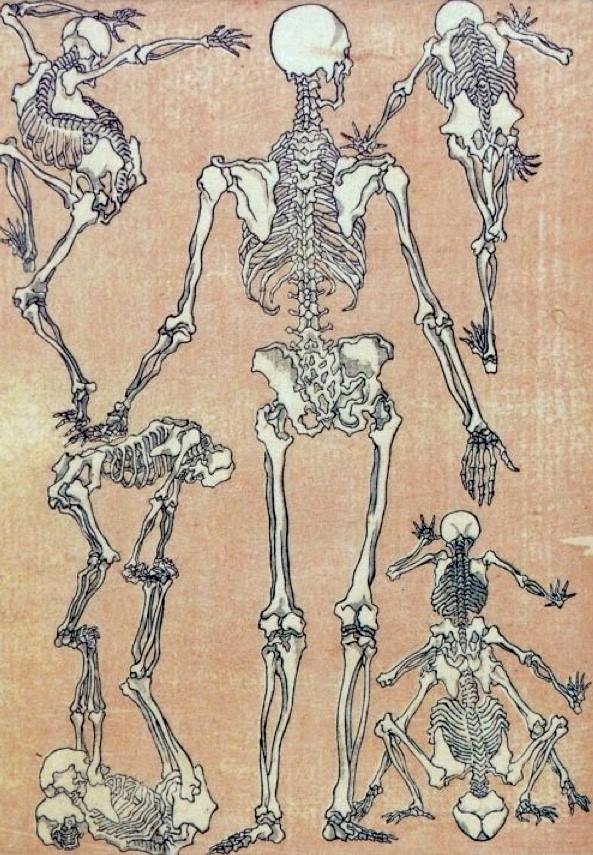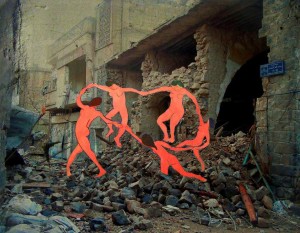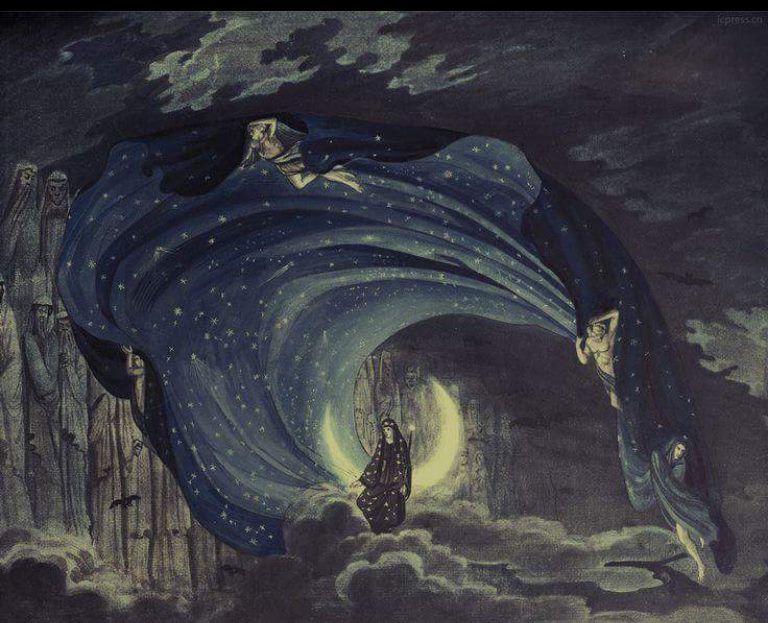It’s Pluto season. The Sun and Mercury are in Scorpio (10/23 – 11/22 and 11/1-20, respectively) and a T-square with Venus and Uranus will bring Pluto’s mysteries into relationships (11/20-23).
I’m no fan of what’s happened to Halloween,(1) the Scorpio sabbat. We’ve turned it into a consumer blow-out of cheap thrills – sucrose overdose for the youngsters, faux-sexy costumes for the grownups – that I think must have the dark god wincing in disgust.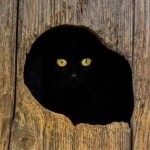
Planet of death
I have also been lobbying against calling Pluto “the planet of Death.” It’s a darn catchy phrase, but it perpetuates an epochal misunderstanding: that death is the end.
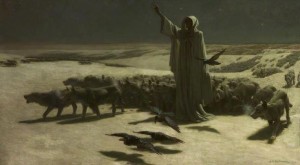 The notion that life comes to a definite, final end, when everything stops,(2) might be the biggest lie ever told. As astrophiles, we really shouldn’t fall for it.
The notion that life comes to a definite, final end, when everything stops,(2) might be the biggest lie ever told. As astrophiles, we really shouldn’t fall for it.
To think of Pluto as “the planet of death” is to mention only part of its meaning. In fact, this is the planet of death/rebirth. Granted, it’s clunky to fit all those words into every reference. (3) But if we fail to realize that “the planet of death” mentions only the first half of an irreducible cycle, we distort the planet’s meaning so badly as to totally miss its point.
Cooties
It’s tricky, however, to imply otherwise. To suggest that death isn’t the end makes critical thinkers back away, as if you were contagious with crank cooties. In the modern world, any allusion to eternity or an afterlife is immediately presumed to mean the Christian heaven, a concept that has been losing intellectual legitimacy since the Enlightenment. Or else it pegs you as a believer in past lives {spooky music here}, which sloppy usage has given a bad rap.
The reason reincarnation has been made to sound ridiculous is because it’s been framed in ridiculously limited terms. We impute to it the rules of our known reality. But post-death experience surely takes place in a different reality. To me it makes no  sense to expect that, once we leave the Earth plane, we’d bring its rules and regulations with us.
sense to expect that, once we leave the Earth plane, we’d bring its rules and regulations with us.
The existence of a realm outside of physicality, and outside of calendar time, is so hard to imagine that most of us stick with the reality we know, as a frame of reference. “Believing” in reincarnation without a holistic understanding of Plutonian law is like trying to translate Shakespeare into emoticons. No wonder it sounds lame, with everybody going around claiming they were Cleopatra.
Literalizing the non-literal

We humans do this a lot with subtle metaphysical concepts. We literalize them. We try to translate them into the terms of our own world, where cause-and-effect prevails, and things exist in space and time.
The Elizabethans spent great amounts of time and treasure trying to figure out where, on planet Earth, the Garden of Eden was located. Some contemporary schools of Christianity are still searching for remnants of an actual Noah’s ark, or putting their faith in a text etched on physical golden plates.
But literalizing the numinous is problematic not just because it’s intellectually 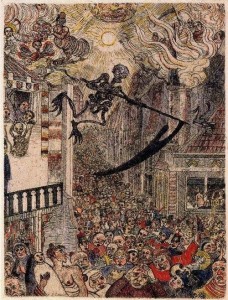 dubious. It’s problematic because it takes our power away.
dubious. It’s problematic because it takes our power away.
Superstition
Take the example of a farmer whose crops are failing, so he goes to the temple and places a plate of fruit in front of Ganesh. As a symbolic act, this could be a direct, personal, heart-opening exercise, by means of which he gets in touch with universal forces – like the spirit of abundance — that permeate all existence. They exist externally as well as within himself.
But in his desperation, he reduces the ritual to a cause-and-effect act. He says to himself, I’ll put this offering here, and my crops will survive. This approach makes him a powerless supplicant. He’s dependent on an external force or supernatural being. Instead of focusing on opening himself up to a certain aspect of the cosmos of which he is a part, he projects this aspect onto a fixed, concrete deity, who lives in the sky or somewhere. Somewhere outside of himself. (4)
This is the stuff of superstition, of magic spells.
Dark Mysteries
Notable exceptions aside, we are a spiritually immature species. But that’s why we came to Earth School. There’s no shame in struggling to understand the ineffable.
Quite the opposite. Who can fathom the miracle of birth and death? What’s presumptuous is refusing to concede our lack of comprehension. We suppose that if we’re smart enough, we can fathom the unfathomable without a lot of inner work. But in every religious tradition, approaching the Dark Mysteries ego-first, as the sorcerer’s apprentice did, is linked with disaster.(5)
When we try to wrestle the numinous to the ground until it fits into our understanding, we’re mistaking knowledge for wisdom. This is what we’re doing when we foist literalism onto sacred symbols. We’re submitting them to a part of the brain that doesn’t have the chops to understand them.
Recycling
We call Pluto “the planet of death” because we can’t quite wrap our minds around its second half: “…and Rebirth.” At least, we can’t imagine it happening to ourselves. We certainly see rebirth in Nature, everywhere we look, in every bare branch that produces buds, in every herd that bears young in the spring. But not for our own beings.
This is because we’re locked in a separation fantasy. We see humanness as a condition that exists apart from everything else on Earth. Earth’s rules, like recycling, are supposed to not apply to us.
I think that if we were to dispense with this proud exceptionalism, we wouldn’t find reincarnation at all hard to believe. If we saw our human selves operating the way plant life operates – with the constituent parts breaking down at the end of a season, and reformulating at the start of a new one – reincarnation would seem consistent and obvious.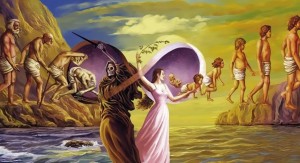
Exceptionalism
We are curiously inconsistent in our thinking. We claim to accept that energy is never created nor destroyed, it just changes form. Human consciousness is energy — what else could it be? — yet we imagine the law of conservation of energy doesn’t apply to human consciousness.
We have no trouble believing that the cells of our body die and get reborn all the time, each retaining the information of the generation of cells that came  before it, each tiny death/rebirth occurring smoothly in an unbroken flow. But we imagine that human lifetimes don’t work the same way: one segueing into the other, births and deaths mere pivot points along the continuum.
before it, each tiny death/rebirth occurring smoothly in an unbroken flow. But we imagine that human lifetimes don’t work the same way: one segueing into the other, births and deaths mere pivot points along the continuum.
It’s the ego, of course. It feels it must fight tooth and nail for our individuality, which it equates with separateness. The ego has forgotten that the singular self is merely(6) a role we were assigned for the duration of this lifetime. It doesn’t know that we have a much bigger role; that beneath and beyond the personal identity, we’re part of Everything.(7)
But Pluto knows it, and operates as if it were so. In this, Pluto’s season, pay attention to the planet’s placements natally and by transit. These spell out the circumstances under which you can glimpse the truth beyond the ego’s story.
Notes:
1 See this essay about the thinning of the veils between the worlds.
2 What do people mean, anyway, when they say, “Death is the end.” Is the idea that suddenly everything goes black, as we thought when we were children? I talk about this in detail in The Big Death Scam.
3 The very fact that, in English, the clunky phrase “death/rebirth” is required to convey the concept, illustrates the limited underlying assumptions that are hardwired into our thinking. It is no accident that we don’t have a single word that means “death that turns into rebirth that turns into death again, etc, ad infinitum.”
 4 The literalizing of sublime symbols in all three Abrahamic religions has resulted in cartoonish imagery that seems more suitable for comic books than for serious adult soul-work. Among these: The statues of Jesus’ mother that shed tears of actual H2O (not all of them: the pope needs to make that call); the depiction of Jehovah/ Yahweh as a bearded old white guy in the sky, and the Devil as a red guy with a goatee below the Earth; the contention that if you (male) die a martyr, you get to ravish multiple virgins in the afterlife.(Haven’t you always wondered whether women martyrs have a counterpart prize? Let’s leave it up to Amy Shumer to imagine what it might be.)
4 The literalizing of sublime symbols in all three Abrahamic religions has resulted in cartoonish imagery that seems more suitable for comic books than for serious adult soul-work. Among these: The statues of Jesus’ mother that shed tears of actual H2O (not all of them: the pope needs to make that call); the depiction of Jehovah/ Yahweh as a bearded old white guy in the sky, and the Devil as a red guy with a goatee below the Earth; the contention that if you (male) die a martyr, you get to ravish multiple virgins in the afterlife.(Haven’t you always wondered whether women martyrs have a counterpart prize? Let’s leave it up to Amy Shumer to imagine what it might be.)
5 With bio-engineering, for example, the human ego sets itself up to compete with the divine. I am quite sure that the early Mother Goddess worshippers would have considered cloning and cryogenics to be the most execrable form of hubris imaginable.
6 Not “merely” in the sense of something to be dismissed. That would be the ultimate cop-out.
7 On a theoretical level, I don’t think any of us doubts that this trans-egoic identity is who we really are. Goddess knows there are millions of FaceBook posts all over the internet every day proclaiming some version of “I am One with All-That-Is”; “I am the Universe.” But if we were wholly on board with it, would we keep ourselves imprisoned the way we do, imagining ourselves to be no more than our current form and its life circumstances? Would we allow the ego to dictate who we are? Would we fear death?

